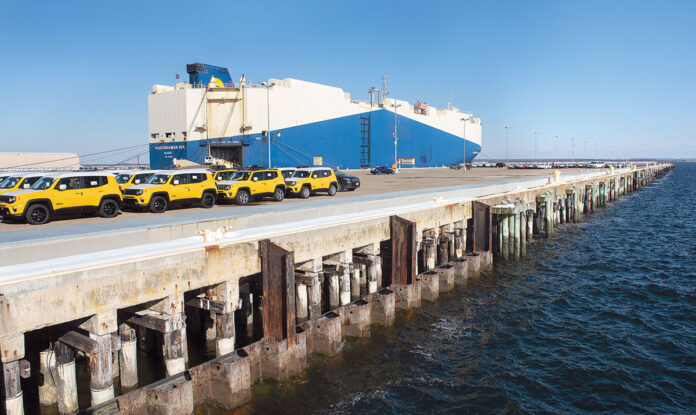Major ports around the country are jammed with ships carrying products and materials waiting to be delivered to their final destinations, but Rhode Island’s largest port is feeling the impact of pandemic-related supply chain disruptions in a much different way.
While ports in areas such as Southern California have experienced long lines of ships that need to be unloaded and cargo waiting on the docks, the Port of Davisville in North Kingstown, which primarily serves as an import point for automobile manufacturers, has seen ship arrivals drop significantly this year.
“We’re not experiencing any backup like we’re seeing on the West Coast,” said Steven J. King, managing director of Quonset Development Corp., which oversees the Quonset Business Park and the Davisville port. “The pandemic is having an opposite effect on our traffic, meaning traffic is down because manufacturers have been shut down by the pandemic in general, and supply in ships.”
Automobile imports, which comprise 95% of the port’s inbound traffic, were down by more than 25% in 2020 compared with the year before, King said, and 2021 has been much slower than 2020.
After unloading 338,447 cars at Davisville in 2019, North Atlantic Distribution Inc. – the auto importer located at Davisville – was down to 247,324 cars in 2020, and 143,600 through September of this year.
While the number of ships arriving at the port isn’t down significantly, each ship has been carrying less volume of imports than usual, King said.
King hasn’t seen any layoffs at port-related businesses in Quonset at this point. “But obviously the less volume means less commerce, and less commerce leads to less jobs and so forth,” he said.
An end to this issue isn’t on the immediate horizon, but King remains hopeful that the amount of material and products coming into the port will rebound within the next six to 10 months. That’s when King anticipates that the port might experience some of the congestion that has choked other major ports.
The Port of Davisville should be better prepared to meet a “large influx” of imports by the time they arrive, King said, with a new berth in service and a modernized pier in the works, which is slated for completion in May.
“Everybody is geared up and ready to go as we see the future horizon bringing up business,” King said.
Officials at ProvPort Inc., the agency that oversees the Port of Providence, were not available for comment about activities at the state’s other major port.
The global supply chain problems causing gridlock at some ports are apparent in other ways at the Quonset Business Park, King said, with construction in the park slowed due to the late shipment of building materials.
The problem of late shipments is hitting Rhode Island’s manufacturing community at large, said Kathie Mahoney, center director of Polaris MEP.
Polaris, which assists manufacturing companies with business improvement programs, has noticed “companies having difficulty getting the materials that they need in order to produce their product,” Mahoney said.
“Some companies are paying more for inventory,” she said. “When possible, they are stockpiling the materials they need in order to ensure they have the materials required in order to produce their product.”
Many of the materials that manufacturers need “may be sitting in ports waiting to be unloaded,” Mahoney said. Ports aren’t the only choke points in the supply chain. Widespread worker shortages have caused delays across entire shipping routes, too.
With most manufacturers Polaris works with reporting supply chain problems, Mahoney said the nonprofit is trying to connect clients with local companies that could be producing needed materials instead of shipping them in from foreign sources, or they are connecting clients with resources from Manufacturing Extension Partnerships in other states.
Jacquelyn Voghel is a PBN staff writer. You may email her at Voghel@PBN.com. 











